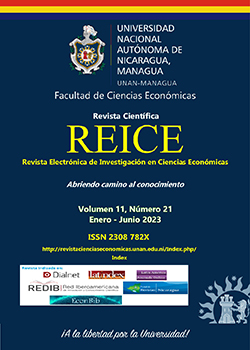Digital trade in global markets
DOI:
https://doi.org/10.5377/reice.v11i21.16517Keywords:
Digital trade, e-commerce regulation, digital trade barriers, digital trade restrictions, e-commerce requirements, digital openness of countriesAbstract
Digital trade regulation significantly varies at the national level in particular countries and the regional and international levels. The authors show that the rapid development of the Internet and new business models entails the need to change traditional policies and regulatory measures regarding such issues as access to the market for goods and services, data traffic control, censorship, intellectual property rights protection, privacy standards, information security, and many others. Digital trade regulation worldwide is still initially. At the international level, there is no common terminology in the field of digital trade, no unified methodology for calculating statistical amounts of digital commerce, no assessment of the digitalization level of various sectors, no unified methods for identifying barriers to digital trade and approaches to assessing their impact on business. One of the benefits of digital trade is increased transparency, traceability, and control of transactions made electronically. Global digital platforms provide significant opportunities for companies worldwide (especially startups and small businesses) to expand into new markets. The spread of 3D printing and additive manufacturing technologies promotes the growth of cross-border flows of electronically traded physical goods. One of the most excellent opportunities the digital era offers is the ability to collect and process a huge amount of information (big data). Big data analytics significantly improves the efficiency of management decisions, which is extremely important for business and public administration. So far, large corporate companies in technologically developed countries have proved to be more adept at using this opportunity. As a result, their governments have stepped up their efforts to overcome the imbalance in managing the complex macroeconomic system. At the same time, as the practice of many countries shows, the same technologies can be used against national security. The threat of developing cognitive weapons to manipulate human behavior, destabilizing the political situation, and changing the government becomes quite serious.
Downloads
References
Chad, P. B., & Petros, C. M. (2019). Governing Digital Trade. World Trade Rev, 18, 23–48.
Digital Economy and Society Index 2018 Report – European Commission. (2018). URL: https://ec.europa.eu/digital-single-market/en/news/digital-economy-and-society-index-2018-report.
Digital economy report (2019). Embargo Digital Economy Report (2019). United Nations Conference on Trade and Development. URL: https://unctad.org/en/PublicationsLibrary/der2019_en.pdf.
Irtyshcheva, I., Kramarenko, I., & Sirenko, I. (2022). The economy of war and postwar economic development: world and Ukrainian realities. Baltic Journal of Economic Studies, Vol. 8. No. 2. P. 78–82. DOI: https://doi.org/10.30525/2256-0742/2022-8-2-78-82.
Kryshtanovych, M., Akimova, L., Akimov, O., Kubiniy, N., & Marhitich, V. (2021). Modeling the process of forming the safety potential of engineering enterprises. International Journal of Safety and Security Engineering, 11 (3), 223–230. doi:10.18280/ijsse.110302.
Lally, M. A. Ukraine Reconstruction: Priorities, Institutions, and the Private Sector. American Foreign Service Association. URL: https://afsa.org/ukraine-reconstruction-priorities-institutions-and-private-sector.
Lewarne, S., & Snelbecker, D. (2004). Economic Governance in War-Torn Economies: Lessons Learned from the Marshall Plan to the Reconstruction of Iraq', Long Report Prepared for USAID, The Services Group, Inc., Arlington, 133 p.
Luong, T., & Nguyen, D. K. (2021). Special Issue: International Trade and Business in the Age of Digital Transformations. Singap. Econ. Rev, 66, 969–972.
Makiyama, H.-L., & Narayanan, B. (2019). The Economic Losses from Ending the WTO Moratorium on Electronic Transmissions. ECIPE Policy Brief. 3/2019. URL: https://ecipe.org/wp-content/uploads/2019/08/ECI_19_PolicyBrief_3_2019_LY04.pdf.
Meng, X., Sun, L., & Wang, H. (2020). The impact of digital service trade barriers and regulatory policy heterogeneity on digital delivery service trade. Asia Pac. Econ, 6, 42–52; 147.
Popov, O. O., Iatsyshyn, A. V., Iatsyshyn, A. V., Kovach, V. O., Artemchuk, V. O., Gurieiev, V. O., ... Kiv, A. E. (2021). Immersive technology for training and professional development of nuclear power plant personnel. Paper presented at the CEUR Workshop Proceedings, 2898, 230–254. Retrieved from: www.scopus.com.
Qi, J. Y., & Qiang, H. J. (2022). Cross border data flow restriction, digital service input, and technological complexity of manufacturing export. Ind. Econ. Res, 1, 114–128.
Shevchenko, I. O. (2022). Formuvannia metodolohichnoho pidkhodu do vyznachennia rozvytku tsyfrovoï torhivli na hlobalnykh rynkakh. Tsyfrova ekonomika ta ekonomichna bezpeka, 3 (03). DOI: http://doi.org/10.32782/dees.3-12 (in Ukrainian).
Shevchenko, I. O. (2022). Intehratsiia ekonomiky Ukrainy u hlobalnu svitovu ekonomichnu systemu [Integration of the economy of Ukraine into the global world economic system]. Implementation of modern technologies in science. Proceedings of the XIII International Scientific and Practical Conference. Varna, Bulgaria. P. 140–143. DOI: http://doi.org/10.46299/ISG.2022.2.13 (in Ukrainian).
Shevchenko, I. O. (2022). Rehuliatorna konkurentsiia v tsyfrovii torhivli na hlobalnykh rynkakh. [Regulatory competition in digital commerce in global markets]. Abstracts of IХ International Scientific and Practical Conference. Belgium, Brussels. P. 64–67. https://eu-conf.com/ua/events/promising-ways-of-solving-scientific-problems/ (in Ukrainian).
Shevchenko, I. O. (December 19-21, 2022). Elektronna komertsiia yak instrument zabezpechennia rozvytku tsyfrovoi torhivli. [Electronic commerce as a tool for ensuring the development of digital trade]. VIII International Scientific and Practical Conference "Science, trends, and development methods," Tokyo, Japan. P. 84–88. https://eu-conf.com/ua/events/science-trends-and-development-methods/ (in Ukrainian).
Sun, J. (2020). From digital economy to digital trade: Connotation, characteristics, rules, and influence. Int. Econ. Trade Explor, 36, 87–98.
Tamir, A. (2021). The new distributed digital technology world trade and MNEs: Another step in the inventive process. Eur. J. Int. Manag, 15, 135–145.
The Factory of the Future. Industry 4.0 – The challenges of tomorrow. KPMG AG, 2016. 67 р.
Top 10 Strategic Technology Trends for 2020 Gartner, Inc. URL: https://www.gartner.com/en/doc/432920-top-10-strategic-technology-trends-for-2020.
Tzifakis, N. Post-Conflict Economic Reconstruction Princeton University Encyclopedia Princetotoniensis. URL: https://pesd.princeton.edu/node/586.
Ukraine Reform Conference. Ukraine's Recovery Plan Blueprint. URL: https://ua.urc2022.com/plan-vidnovlennya-ukrayini
UNDP Digital strategy – Future forward – United Nations. (2019). Development Programme. URL: https://digitalstrategy.undp.org.
Williams, Andrew J. (2005) “Reconstruction” before the Marshall Plan. Review of International Studies 31, No 3, 546 p.
WTO. Joint Statement on Electronic Commerce. WT/L/1056. January 25, 2019. URL: https:// trade.ec.europa.eu/doclib/docs/2019/january/tradoc_157643.pdf.
Yue, Y. S., & Zhao, J. H. (2020). Research on the characteristics and influencing factors of digital service export – Analysis Based on Transnational panel data. Shanghai Econ. Res, 8, 106–118.
Vyshlinsky, H., & Repko, M. (2022). Ukrainian Economy in War Times. October 2022. Centre for Economic Strategy, German Economic Team, 22 p.
Sofii, O. (2020). "Europe-2020" Strategy: Putting a Human at the Center. European Dialogue. URL: http://dialog.lviv.ua/strategiya-yevropa-2020-u-tsentrilyudina (in Ukrainian).
Strategy for the Development of the Innovation Sector by 2025, Approved by the Cabinet of Ministers of Ukraine on July 10, 2019. Document 526-2019-р. URL: https://zakon.rada.gov.ua/laws/show/526-2019-%D1%80#n12 (in Ukrainian).
Strategy for the Development of the Innovation Sector by 2030, Approved by the Cabinet of Ministers of Ukraine on July 10, 2019. Document 526-2019-р. URL: https://zakon.rada.gov.ua/laws/show/526-2019-%D1%80#n12 (in Ukrainian).
Downloads
Published
How to Cite
Issue
Section
License
Copyright (c) 2023 Revista Electrónica de Investigación en Ciencias Económicas

This work is licensed under a Creative Commons Attribution-NonCommercial-ShareAlike 4.0 International License.



